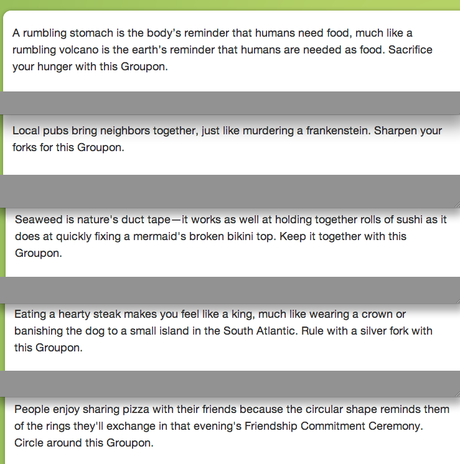Regardless of his management record, Andrew Mason is a weird-in-a-good-way guy, no doubt. His goofy humor permeated everything: did you ever check out the totally goofy, completely unexpectedly funny remarks each Groupon Deal email made about the subject they were featuring?

Those are just great.
That didn’t stop me from piling on, though, in the latest issue of Food+Drink magazine. Here’s what I said in my op-ed (reprinted in full immediately following this colon:):
Are you using Groupon, or vice versa?
Groupon’s in trouble.
CNBC named Groupon CEO Andrew Mason “the worst CEO of 2012” and called him “an expensive joke for those who bought in early on the stock.”
I typed into the Google search bar, “Groupon is” to see how it would complete the sentence. “Groupon issues,” “Groupon is dead,” “Groupon is bad,” “Groupon is it safe” and “Groupon is stupid.” That’s what Google offered as suggestions to complete my search.
The trouble is double: It’s not right for a lot of businesses, and as Groupon limps along pushing spa and massage deals, they alienate a lot of the people who were excited about them in 2009 or ’10 – and those alienated people are the ones you probably wanted to come to the restaurant.
Brief reminiscence: It used to be fun. I remember actually standing beneath the light of my closet, getting dressed in the morning and fumbling with my iPhone to see if there was a good Groupon for a restaurant I loved, and hoping I wasn’t too late to take advantage before the deal closed. I did that kind of a lot. It was sort of exciting! We’d talk about it at work! But there were problems.
I guess there are always problems.
I’d jump on a deal and then it would turn out that my wife and I don’t always feel like eating there. So we’d procrastinate until the coupon was set to expire, then we’d have to go, kind of resentfully, forced to eat someplace just to save some bucks. That’s not the best setting for a romantic night out with the wife: “I know you don’t really feel like Italian but I can’t take advantage of this money savings if we don’t go now, dear. Here, I printed out the Groupon … [pulls crinkly coupon from his pocket, winces as she silently turns and walks glumly to the car].”
Maybe that’s just me. But I bet it’s not – I bet it’s lots of couples. On the night of expiration, the restaurant would overflow with these grumpy couples trying to keep from losing the deal.
Eventually the shine wore off. And the deals kept coming, except they were for pool supplies (I own no pool) and “64 percent Off Cup-Holder Speaker, Cigar Samplers, Blood Pressure Monitor & More.” That’s an actual cut and paste from a Groupon email in my inbox.
They may fix those problems, or they may not. LivingSocial might beat them, or follow them down the drain. It’s all unguessable right now (although the stock market is betting against Groupon these days).
Still, for some people, it could be right.
Here are five pieces of advice, if you’re considering dialing that rep.
-
DO IT ONCE. THEN WAIT.
The ROI is tough enough – don’t toughen it further by doing it twice. It’s like rabbit hunger, that classic situation where it takes more calories to hunt, dress and cook the rabbit than you get from the meal. Don’t keep doing it if you’re not building significant traffic, or you’ll just dig an ROI hole. (Or hand no-obligation discounts to people who were already showing up.)
-
WHAT’S THE BEST EXPERIENCE?
Ideally, you’ll give people what in my Psych 101 class they called a “schema:” a basic framework of expectations you keep in your brain. Train people to love having a schema of you. Get the staff to recommend the good stuff when they show up, and pay extra attention to them. You really need them to come back.
-
MAKE SURE YOU’RE STAFFED.
What a common experience it was for customers to stampede into an understaffed restaurant the night before the coupon did the Cinderella bit. If there aren’t enough people in your kitchen or out there making a great experience on Expiration Night, you’ve basically created a case study for The Problem With Groupon.
-
PUT PRESSURE ON YOUR REP.
I think you have the upper hand. Groupon needs restaurants—they’re the best thing it does. Even a guy in 2010 doing research thought so. My friend forwarded me this study, which is now kind of old. At the time, the researcher said 66 percent of Groupon participants saw a profit and indicated that restaurants seemed especially well-suited to use Groupon.
But then the researcher ended up concluding: “There is evidence from this study that raises some concerns about the sustainability of social promotions as they currently exist. We believe these promotions are structured in such a way that they give too much value to consumers and not enough value to the small businesses than run them.” The study was “How Effective are Groupon Promotions for Businesses?” by Utpal M. Dholakia. And that was back in the good old days.
-
EH, MAYBE DON’T DO IT.
Is there a better way to get people in? Yeah. The people you want may have been chased off by that cup-holder offer. And really, if a well-run restaurant made great food in 2007, they managed to succeed. People were attracting new customers and converting them to fans long before Groupon ran its ads during the 2011 Super Bowl.
Your restaurant really doesn’t need a quick hit from Groupon. Just go back to doing a great job and experiment with other marketing ideas. In the meantime, maybe Groupon will pull out of its nosedive. And maybe not. Watch your email inbox.
